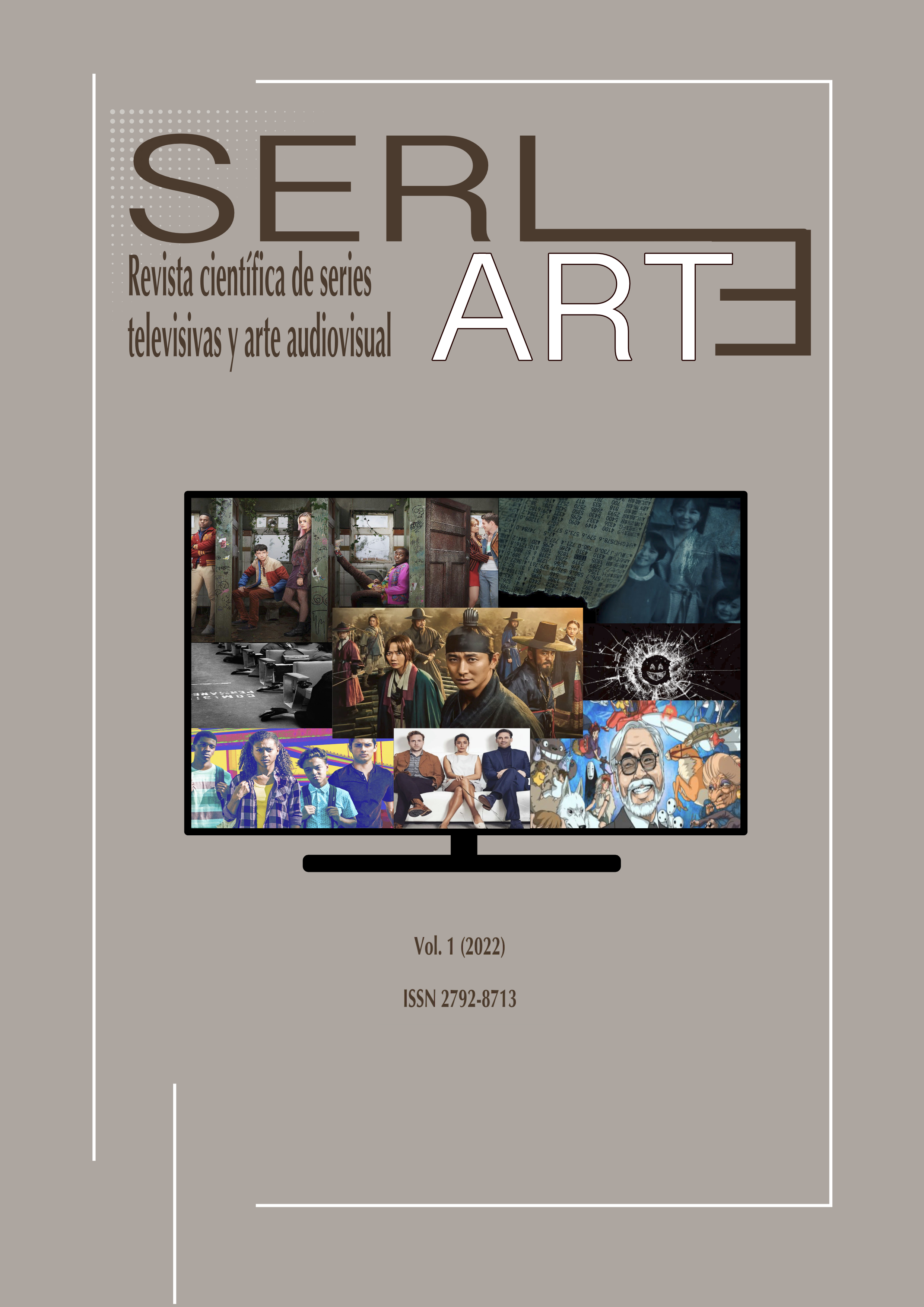Kingdom y el auge del zombi en la ficción televisiva surcoreana
Main Article Content
Abstract
The proliferation of video-on-demand platforms and the globalization of television horror in the last few years has led to the appearance of representative monsters of Western popular culture in national contexts where they are not usually found. Starting from this premise, this article focuses on the study of those cultural, social and economic factors that have contributed to the popularization of zombie narratives in South Korea. Likewise, we will analyze the television show Kingdom (Netflix: 2019-) with the aim of unraveling the narrative developments it might incorporate with respect to the Western fictions dedicated to this creature, paying special attention to the way in which the metaphorical nature of the living dead is reformulated by adapting it to the cultural anxieties of South Korean society.
Downloads
Publication Facts
Reviewer profiles N/A
Author statements
Indexed in
- Publisher
- Ucopress. Cordoba University Press
Article Details
References
ABBOTT, Stacey (2016), Undead Apocalyse: Vampires and Zombies in the 21st Century, Edimburgo: Edinburgh University Press.
ABBOTT, Stacey, y JOWETT, Lorna (2021), “It's Taking Over the Whole World. Global TV Horror, Then and Now”, en ABBOTT, Stacey, y JOWETT, Lorna (eds.), Global TV Horror, Cardiff: University Of Wales Press, pp.1-14.
BLAKE, Linnie (2015), “Are We Worth Saving? You Tell Me: Neoliberalism, Zombies and the Failure of Free Trade”, Gothic Studies, vol.17, n.º 2, pp.26-41. DOI: https://doi.org/10.7227/GS.17.2.3
BYUNG-YEUL, Baek (2019), “Netflix to invest more in Korean content”. En: <https://www.koreatimes.co.kr/www/tech/2021/08/133_262635.html>. (fecha de consulta: 21-06-2021).
CLARK, Travis, y RODRÍGUEZ, Ashley (2021), “El efecto Netflix en la TV mundial: 8 productores internacionales hablan del cambio de prioridades, el aumento de los presupuestos y la guerra de talento ante la creciente competencia del streaming”. En: <https://www.businessinsider.es/como-cambian-prioridades-televisivas-globales-netflix-nueva-competencia-892413>. (fecha de consulta: 06-08-2021).
DEGOUL, Franck (2011), “We are the mirror of your fears: Haitian Identity and Zombification”, en CHRISTIE, Deborah, y LAURO, Sarah Juliet (eds.), Better Off Dead: The Evolution of the Zombie as Post-Human, New York: Fordham University Press, pp.24-38.
DOHERTY, Thomas Patrick (1999), Pre-Code Hollywood: Sex, Immorality, and Insurrection in American Cinema, 1930-1934. New York: Columbia University Press.
DUEÑAS MOHEDAS, Sonia (2020), “Entre el cine independiente y el blockbuster en Corea del Sur: Las obras de Yeon Sang-Ho y su recepción en España”, L'Atalante: revista de estudios cinematográficos, n.º 29, pp.53-66.
GONZAGA, Elmo (2021), “Zombie capitalism and coronavirus time”, Cultural Studies, vol.35, nº. 2-3, pp.444-451. DOI: https://doi.org/10.1080/09502386.2021.1898022
HWANG, Yun Mi (2011), South Korean Historical Drama: Gender, Nation and the Heritage Industry, Tesis Doctoral, University of St. Andrews, Saint Andrews.
JAECHEOL, Kim (2019), “Biocalyptic imaginations in Japanese and Korean films: undead nation-states in I Am a Hero and Train to Busan”, Inter-Asia Cultural Studies, vol.20, nº. 3, pp.437-451. DOI: https://doi.org/10.1080/14649373.2019.1649015
JUN-SUK, Yeo (2019), “Netflix attributes popularity of ‘Kingdom’ to technological innovation”. En: <https://www.koreaherald.com/view.php?ud=20190206000121>. (fecha de consulta: 15-06-2021).
KEELEY, Pete (2020), “Writer, Director of South Korean Zombie Drama ‘Kingdom’ on Global Response and Coronavirus Parallels”. En: <https://www.hollywoodreporter.com/tv/tv-news/netflixs-kingdom-creators-talk-releasing-zombie-drama-coronavirus-1290604/>. (fecha de consulta: 10-07-2021).
LEE, Sung-Ae (2019), “The New Zombie Apocalypse and Social Crisis in South Korean Cinema”, Coolabah, n.º 27, pp.150-166.
LOTZ, Amanda (2020), “In between the global and the local: Mapping the geographies of Netflix as a multinational service”, International Journal of Cultural Studies, vol.24, nº. 2, marzo, pp.195-215. DOI: https://doi.org/10.1177/1367877920953166
MACDONALD, Joan (2020), “Writer Kim Eun-hee Shares Her Inspiration For The Historical Zombie Drama ‘Kingdom’”. En: <https://www.forbes.com/sites/joanmacdonald/2020/03/12/writer-kim-eun-hee-shares-her-inspiration-for-the-historical-zombie-drama-kingdom>. (fecha de consulta: 16-07-2021).
MIN-YEONG, Kim (2019), “A study on the expansion of platform and the aspect of zombie narrative ― Mainly on the basis of NETFLIX original drama season 1”, The Journal of Modern Literary Theory, vol.77, pp.61-85. DOI: https://doi.org/10.22273/SMLT.77.3
MORELAND, Sean (2011), “Shambling Towards Mount Improbable to Be Born: American Evolutionary Anxiety and the Hopeful Monsters of Matheson's I Am Legend and Romero's Dead Films”, en BOLUK, Stephanie, y LENZ, Wylie (eds.), Generation Zombie: Essays on the Living Dead in Modern Culture, Jefferson: McFarland & Co Inc, pp.77-89.
NEIRA, Elena (2020), Streaming Wars: La nueva televisión, Barcelona: Planeta.
NEIRA, Elena (2021), “Quién es quién en la guerra del 'streaming': Netflix, la que inventó el modelo que ahora todos copian”. En <https://www.businessinsider.es/netflix-invento-modelo-ahora-todos-copian-905723>. (fecha de consulta: 06-08-2021).
OH, Eunha (2012), Monster Mothers and the Confucian Ideal: Korean Horror Cinema in the Park Chung Hee Era, Tesis Doctoral, University of Texas, Austin.
PEIRSE, Alison, y MARTIN, Daniel (2013), “Introduction”, en PEIRSE, Alison, y MARTIN, Daniel (eds.), Korean Horror Cinema, Edimburgo: Edinburgh University Press, pp.1-20.
PHILLIPS, Kendal R. (2005), Projected Fears: Horror Films and American Culture, Westport: Praeger Publishers.
PINEDO, Isabel (2004), “Postmodern Elements of the Contemporary Horror Film”, en PRINCE, Stephen (ed.), The Horror Film, New Jersey: Rutgers University Press, pp.85-117.
RUSSELL, Jaime (2006). Book of the Dead: The Complete History of Zombie Cinema, Godalming: FAB Press.
SHAVIRO, Steven (1993), The Cinematic Body, Minnesota: University of Minnesota Press.
SONG, Sooho (2020), “The Evolution of the Korean Wave: How Is the Third Generation Different from Previous Ones?”, Korea Observer, vol.51, n.º 1, pp.125-150. DOI: https://doi.org/10.29152/KOIKS.2020.51.1.125
TOTARO, Donato (2003), “The Italian zombie film: From derivation to invention”, en SCHNEIDER, Steven Jay (ed.), Fear without Frontiers: Horror Cinema Across the Globe, Godalming; FAB Press, pp.161-174.
TU, Wei-Ming (1998), “Confucius and Confucianism”, en SLOTE, Walter H., y DE VOS, George A. (eds.), Confucianism and the Family, Albany: State University of New York Press, pp.3-36.
WAGNER, Keith B. (2016), “Endorsing upper-class refinement or critiquing extravagance and debt? The rise of neoliberal genre modification in contemporary South Korean cinema”, Critical Arts, vol.30, n.º 1, pp. 117-138. DOI: https://doi.org/10.1080/02560046.2016.1164389
WAGNER, Keith B. (2019), “Train to Busan (2016): Glocalization, Korean Zombies, and a Man-Made Neoliberal Disaster”, en LEE, Sangjoon (ed.), Rediscovering Korean Cinema, Ann Arbor: University of Michigan Press, pp.515-532.
WEPRIN, Alex (2021), “Netflix Adds 1.5 Million Total Subscribers, But Loses Ground in U.S./Canada” En: <https://www.hollywoodreporter.com/business/digital/netflix-q2-2021-earnings-1234985080/>. (fecha de consulta: 06-08-2021).






